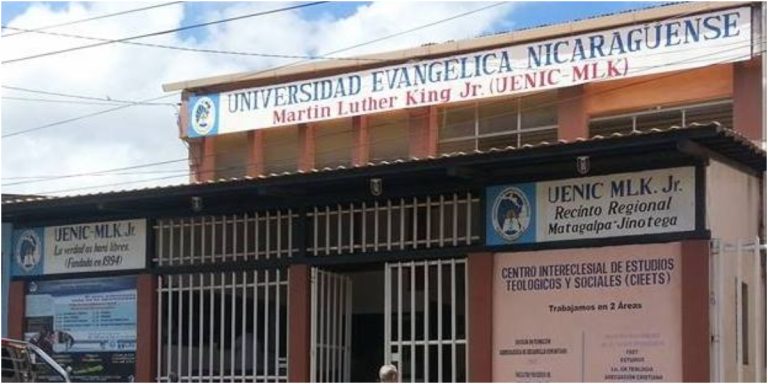31 de julio 2023

Children of Exile: The Births “Sowing Hope” in the Camp of Nicaraguan Farmers

PUBLICIDAD 1M
PUBLICIDAD 4D
PUBLICIDAD 5D
In Nicaragua, at least 20 universities have been shut down since 2018. They are accused of failing to meet quality indicators and more

The Martin Luther King Evangelical University (UENIC), based in Matagalpa. Photo from social networks.
On Friday, the Nicaraguan Interior Ministry canceled the legal operating status and confiscated the property of two more universities: the Universidad Evangelica Martin Luther King (UENIC) and the Universidad de Occidente (UDO). Among other things, the universities are accused of failing to comply with the “minimum standards” of quality and of offering academic courses that haven’t been authorized by the country’s Rector of Higher Education.
As with the previous cancellations (see partial list below) and those of other NGOs, there is neither a review process, nor an improvement plan, nor any form of appeal against the closure decisions, which are announced unilaterally, often without warning.
With the cancellation and confiscation of these two universities, the number of Non-Governmental Organizations the Nicaraguan government has closed since 2018 now totals 3,719. Another unspecified number of organizations have “voluntarily dissolved,” in order to avoid having their assets confiscated. In the case of the UENIC, the Interior Ministry formalized their decision by publishing it in the Nicaraguan government’s official Gazette on July 28. The publication details that the cancellation was requested by the National Council of Universities (CNU) and the National Council of Evaluation and Accreditation (CNEA). This was done through Evaluation Resolution No. 07-2023 of July 25, 2023- that the university “partially fails to comply” with the minimum quality standards required to obtain the corresponding accreditation.
They accuse the university of including the CNU and CNEA logos in its institutional documents without authorization and that the fees for degrees are “exorbitantly priced,” in violation of Law 1088, the Law for the Recognition of Degrees and Degrees.
It is also accused of having campuses and academic offerings not authorized by the CNU and CNEA and of not having the basic infrastructure to function as a university. According to the publication, the international academic offer of the UENIC has been suspended since March 29.
In the case of the UDO, the accusations come from Migob, CNEA and CNU. Ministerial Agreement N° 100-2023 says that this university has not reported its financial statements for 2022, which hinders “the control and surveillance” of Migob and goes against the “policies of transparency in the administration of funds” of the university.
In addition, after an evaluation carried out by the CNU and CNEA on July 25, 2023, they concluded, through Evaluation Resolution 008-2023, that the university “teaches courses not authorized by the CNU and CNEA” at the León, Managua, and Estelí campuses. Furthermore, "it does not meet the minimum quality standards” due to the fact that it has “academic deficiencies in its subjects, number of teachers and operating structure,” they add.
They also accuse the UDO of having offered undergraduate degrees and master's degrees in Higher Education to students of other nationalities, which were not authorized by the CNU. In addition, they are accused of having opened a branch in Nueva Guinea without reporting it to the CNU.
In both closure decrees, the Interior Ministry requests that the Executive Boards of both universities “in an orderly and expedited way” submit the information regarding the students, professors, careers, course syllabuses, and their database of registrations and grades so that the students can be relocated to approved universities. It should be noted that this takes place at the mid-year break for most Nicaraguan students, leaving many of them up in the air halfway through the year.
Accompanying these decisions, it was immediately announced that the Attorney General’s office would carry out the “transfer of the assets, property and furniture of these universities” to the Nicaraguan State.
Despite the flurry of decrees and publications, critics assert that the cancellation and confiscation of both the “Martin Luther King” and the “University of the West” is part of the persecution the Ortega-Murillo regime has maintained against organizations of civil society.
Most recently – Universidad Adventista de Nicaragua (UNADENIC); Universidad del Norte de Nicaragua (UNN) and Universidad Metropolitana (UNIMET).
Other universities the Ortega regime has closed, mostly in the last two years:
Universidad Politécnica de Nicaragua (Upoli), Universidad Católica del Trópico Seco (Ucatse), Universidad Popular de Nicaragua (Uponic), Universidad Nicaragüense de Estudios Humanísticos (Uneh), Universidad Paulo Freire (UPF), Universidad Hispanoamericana (Uhispam), Mobile University Latin American Campus (Fumlac), Florida International University, Wake Forest University, Universidad Thomas More (UTM), Universidad Centroamericana de Ciencias Empresariales (Ucem). Universidad Particular en Ciencias del Mercado, Universidad Juan Pablo II, Universidad Cristiana Autónoma de Nicaragua (UCAN). Universidad Internacional de la Integración de América Latina (UNIVAL).
This article was originally published in Spanish in Confidencial and translated by Havana Times.
PUBLICIDAD 3M
Confidencial es un diario digital nicaragüense, de formato multimedia, fundado por Carlos F. Chamorro en junio de 1996. Inició como un semanario impreso y hoy es un medio de referencia regional con información, análisis, entrevistas, perfiles, reportajes e investigaciones sobre Nicaragua, informando desde el exilio por la persecución política de la dictadura de Daniel Ortega y Rosario Murillo.
PUBLICIDAD 3D